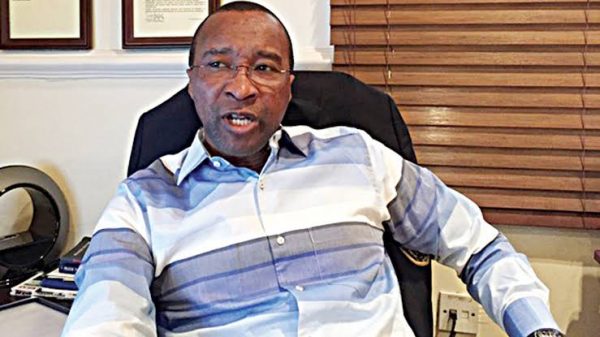Managing Nigeria’s Inflation, Foreign Exchange: The Angola Example

The economy is stretched to its knees lately but not irredeemable if the managers are able to get their acts right. This is the core message of this engaging interview with High Chief Johnson Chukwu, the Managing Director of Cowry Assets Management Limited. He featured in the Arise Television programme monitored by MMS Plus. How can this economic mess be cleaned up? He gave a riveting perspective with practical references. Enjoy it.
Can you help us relate the current inflation figures across the psychological threshold, everything is seeming to appear tragic and this really leads to harsh circumstances. We may not understand percentages; we feel the pandemic of empty pockets and the hardship that we have to deal with on daily basis.
Let me put it this way, an inflation rate of 20.52 per centfor an average person means that, if you were earning hundred thousand naira last year on the monthly basis, and you are still earning the same hundred thousand naira in August this year, it simply means that your hundred thousand naira last year is just about eighty thousand naira this year because, the value of that currency has been eroded by 20 per cent. So you can no longer afford to buy the same quantity of goods and services you used to buy the previous year. And that is how it affects Nigerians, and to put this in a better context, we have to understand the fact that when you talk about inflation, it is done year on year which is, you are comparing the price level in August 2021 to the price level in August 2022. If you step back further and you realize that most Nigerians have not enjoyed any salary increment in the past two years and you consider that the August 2021 inflation was about 17.01 per cent, it then means that a person who was earning the same salary in August 2020 has had his income eroded by 37 per cent because if you add the 17 per cent that you had on the yearly inflation as at August last year to the 20.52% of this year, you are talking about 37.52% in the last two years. So in effect, if your salary was constant over the past two years, you can only afford just about 60% of what you used to buy. And if you take it further to the food inflation, food inflation in the month of August this year was 23.12% and I emphasize this food inflation because, an average Nigerian household, household consumption is largely food, so, for an average household, within the last one year they can no longer afford the same quantity of food they bought last year. And because the values of those food items have increased to about 23.12 per cent and when you check it further and discover that your salary has been constant for the past two years, August inflation in 2021 was 20.3%. so in effect, the average price food items for average household has increased to about 43 per cent in the past two years, so in effect an average household can only buy just about 55 per cent of what they used to buy with the same level of income if that income was spent mainly on food and that is why Nigerians are hurting, that is why the average household if you talk of inflation they are looking at how it affects their pockets. The fact that your pocket, if you are looking at what you consume in terms of food, has been eroded by about 43.4% in the last two years is a cause for concern. So that is it and the questions are these: What are those factors that cause inflation? Food inflation in August this year was driven by critical factors such as the price of bread, of course you can attribute the price of bread to the price of wheat because, we import wheat, we know the price of bread has gone up, then the price of other cereals , then you talk of prices of tubers such as potatoes, yams and other tubers. And you talk of fish and oil. If you look at potatoes, yams and other tubers that are produced locally, why is it that their prices have gone up? This is because farmers have been displaced in their farms. You have displacement of farmers in the North East, you go to the North West and North Central and it is coming down south. Even the National Bureau of Statistics states that the food inflation was caused by the farmers displacement because farms produce cannot be taken to the markets. I understand farmers pay taxes in states like Zamfara state to go to the farm. So that is one factor. The other factor is core inflation. What are those factors that have increased the prices in the month of August? They are the prices of gas, the prices of fuel, solid fuel and liquid fuel. Then you talk you talk about the transport cost, road transport cost and air transport cost. I understand today that an economy flight ticket in Nigeria today costs, if you use the official exchange rate, it costs about $250. Elsewhere, for one hour flight, that’s not the price. Elsewhere you talk about $80 to fly for one hour in other countries. We are paying about #100,000 to fly for one hour to Lagos, Abuja or Owerri. The business class takes about $300, if you use the official exchange rate. That’s impacting on us and this is because, we are having shortage of forex, therefore we are having elevated price of aviation fuel, in fact, aviation fuel supply is another challenge, you are having high price of diesel which is also impacting on the cost of producing goods and services because, we rely largely on fuel for our production processes. So these are the factors and these are factors that ordinarily if we manage the economy well, we should not be facing.
The spokesperson of the Central Bank of Nigeria said that the problem is with Nigerians, that we the ordinary people of Nigeria are the cause of the problem because we like imported goods, we do not believe in made in Nigeria goods and that we are facing the inflation because of the demand side problem, is it demand side or the issue is really from the supply side. The price of crude oil is going up, Nigeria is not benefiting from that boom and yet, ordinary people get blamed because, they said they have a taste for foreign goods like the suit you are wearing which looks like an imported suit.
Why do you think this was not made in Aba? But in any case, I will take it from two perspectives. Our population is about 250 million people, with that size, there is a minimum level of consumption you should expect. That consumption is sum components of foreign goods because, we do not live in isolation, we do not live in an island. I will give you an instance, today I am in your studio in Abuja and getting this interview is going through internet services, so there is no single unit of data that is produced locally here in the country and it is imported, are you going to shut down and say you will not be able to do this, but that is the fact that there are basic consumptions you must have as a country giving the size of your population, but let us take it in a more detailed context. We are not the only country in the world that is going through pressures because we import goods, but every other country which is an oil exporting country is having a different story. And I am going to use the country that used to be the second largest producer of crude in Africa which is now the largest producer of crude in Africa to give an instance, so that we know that what we are facing is not imposed by citizens or imposed by nature. It is because of the policies that people in authority have taken and not the citizens, because the citizens cannot take decisions on how to produce crude, whether to produce enough crude, the policies that will ensure that there is relative peace in the oil producing areas so that crude can actually come out. I give you an instance of Angola, in January this year, the inflation in Angola was 27.66 per cent that was the all items inflation in Angola before the war started. The Russian and Ukranian war started and Angola began to enjoy the benefit of being an oil producing country. And today as at the end of August, their inflation had dropped to 19.78%. Angolan currency on December 31 was on the exchange rate of 562 Kwanza to $1. As at September 16th, 2022, it has dropped to 428 Kwanza to $1 and that is how a country that used to be the second largest producer of crude rose to be the largest oil producing country in Africa. So, if we have continued to maintain our position as the largest producer of crude in Africa we should be talking of an appreciable local currency and lower inflation rate. Because virtually all the major crude producing countries in the world are not going through the pressures we are going today. Unless you want to convince me that it is your duty and my duty to make sure that we have peace in Niger Delta, it is your duty and my duty to encourage oil prospecting and oil mining. Then, that is when I will subscribe to that statement so made by the Central Bank of Nigeria official. But otherwise I think it is begging the situation, we need to challenge those in leadership positions so that they do the right things. Because we should not find ourselves in the current situation where we found ourselves. We ordinarily have these natural resources but for one reason or the other, principally because of lack of appropriate policies, overtime, there is no proper investment in the upstream sector that is the oil and gas sector, they have not been engagements of the citizens of the oil producing regions so they can allow for crude production. What we are witnessing are the fallout of those issues and not necessarily because we are demanding for those basic items that any other part of the world would be demanding.
What should government do, since May the Monetary Policy Committee has increased interest rate, tightened monetary policy by 250 basis points up to 14% which is the standard thing that is done in other countries except may be in China and Turkey but Nigeria has tried the same formula, tightened monetary policy and that has not worked. Why has it not worked? There will be another Monetary Policy Committee Meeting on September 26, some people have been recommending that may be the MPC, should further increase rate by 50 basis point. Do you think that will work, or what we are facing is simply a failure of policy and why?
Well, I had said this repeatedly in different fora that the problem we have, the inflationary pressure we are facing as a country is not driven by liquidity suffice, it is not driven by gloat expansion, the model of using monetary policies to reduce or fight inflation is driven by some logic and that logic is that you have gloat expansion, the consumers are accessing goods at low prices or no cost and because they create things cheap, people are borrowing money to buy goods and services so you have demand and supply but that is not what has driven inflation today. I had mentioned some of those factors, the major things that the NBS stated in the August inflationary report is that factors driving inflation are, difficulties or inabilities to produce food and food items and supply to the market . I had mentioned that, so the issue is insecurity in the food production belts of the country. So the government ceased to identify the problems. The government has a duty to find a way of resolving this insecurity we have in the food producing belt. Nigeria was not like this, it was not like this ten years ago where you cannot drive from Lagos to Abuja without an attack, it was not like that. So, we must realize that something has happened and we must find those things and address them. I used to leave Kano around 5pm to go to Zamfara State with my friends and we will finish wedding in Gusau around 8pm and drive back to Kano. But nobody will even do that in the day today because it is not secured. That is one factor. The second factors are the issues around the core inflation. Some of them are driven by exchange rate. We have seen the consistent depreciation of local currency and when your currency depreciates, the effects of that depreciation is that, the prices of what is imported will go up and that is what is driving up the price of diesel, driving up the price of aviation fuel which is also reflecting in the transportation cost, road transport costs and air transportation. So for us to have a stability in our exchange rate, we must produce enough crude and export. At least, this is a low hanging fruit. In our engagement here, we mentioned the fact that government needs to embrace the locals. Anybody whose community has an oil bearing assets has a level of interest in crude production in the country. So, that is a core of what we need to do now, address the issue of foreign currency supply by improving our export volume and export earnings that will help us stabilize our economy, if we have a stabilized exchange rate, inflation will come down. We use Angola as an example, like I said to us in this programme, that Angolan Kwanza used to be 562 to $1 and that was in December last year and it has moved down to 428 and that has reflected in their inflationary status from 27.66% in January to 19.78% in August. And Nigeria should actually be in a better position , Angola used to produce half of what we used to produce but today,look at the figures for August, Angola produced one million, one hundred and eighty three barrels a day Nigeria produced 972 million barrels per day. Even Libya has overtaken Nigeria. Libya in the month of August produced one million, one hundred and twenty three thousand barrels per day and we are producing nine hundred and seventy two million barrels per day, so that is the core of the problem. Address the issue of crude production so that you can have foreign exchange earnings, address the issue of insecurity in the Northern region so we can produce more food.
The Nigeria Labour Congress has come up with a proposal to say that one way of addressing this inflation problem is for government to address the cost of living crisis by providing a cost of living allowance; economists will say wage indexation. Can Nigeria afford to do this now?.
Well, what I will say is that the government has ways of boosting the impact of the erosion of consumer purchasing power on the average employee. I had given us a graphic illustration that an average Nigerian employee has lost about 43% if you look at the food inflation, about 37% of the value of their income in the past two years if you are looking at all items inflation . So, that is hurting, the government must find a of indexing which is what happens elsewhere in the world. We have to index some of the regulations of workers so that this burden will be moderated. And what matters to government is privatization. We are spending about 6 trillion naira on subsidy, if you take out that and you give some level of 20% income that is tied to inflation, then people will be better off. It is a matter of prioritizing government expenditure and putting money where we will get more value for it.








